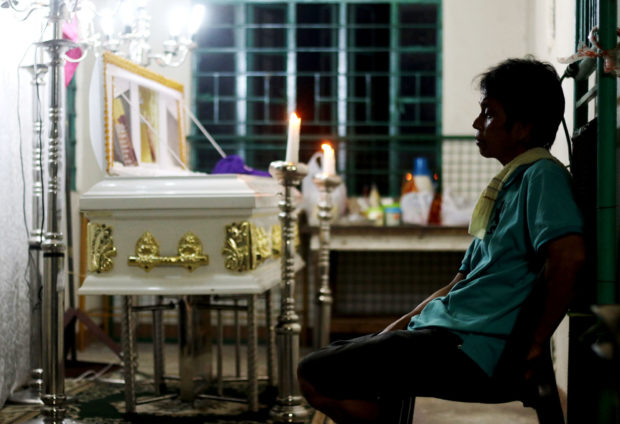Tagle: Nation cannot be governed by killing

LONG NIGHT A grieving Eduardo Gabriel holds a silent vigil on the first night of the wake of his son Reynaldo “Kulot” de Guzman at the mortuary of the Barangay Hall of San Andres in Cainta, Rizal. The body of the 14-year-old De Guzman was thrown into the river in Gapan, Nueva Ecija. —RICHARD REYES
“A nation cannot be governed by killing,” Manila Archbishop Luis Antonio Cardinal Tagle said on Friday in a one-page letter that appealed anew for an end to the spate of killings attributed to the government’s war on drugs.
Tagle also asked for a five-minute ringing of church bells at 8 p.m. starting Sept. 14, the Exaltation of the Cross, to “call on everyone to remember the dead and pray for them.”
“The tolling of church bells in the evening to pray for the dead is an old Filipino custom that has almost disappeared. Now is the right time to revive it,” he said.
Sought for comment, presidential spokesperson Ernesto Abella said Cardinal Tagle’s “noteworthy concern for Filipino families” was a “sentiment shared’ by President Duterte, “as evidenced by his consistent pronouncements to protect the youth and future generations of this country.”
Abella added: “Much attention was given the recent spate of deaths (but) the 1,308,078 drug personalities who voluntarily surrendered as of July 26, 2017, belie the claim that ‘we cannot allow the destruction of lives to become normal,’ and ‘we cannot govern the nation by killing.’ ”
Article continues after this advertisementIn Tagle’s letter issued on the feast day of the Virgin Mary, the prelate denounced as “inhuman and un-Christian” the act of inflicting harm or death on others.
Article continues after this advertisement“With pain and horror, we continue to get daily news of killings around the country,” Tagle said. “We cannot allow the destruction of lives to become normal. We cannot govern the country by killing,” he added.
“We call on those who harm or kill others to listen to their conscience, the voice of God that summons us to do good and avoid evil. Heartless violence can be conquered only by a change of heart and by discovering in the depths of our being the inclination to do good and to love our neighbor,” Tagle said.
The country “cannot foster a humane and decent Filipino culture by killing,” he added.
The letter was by far the archbishop’s strongest condemnation of the spate of killings that began last year when the Duterte administration launched its war against illegal drugs.
The statement came amid public outrage over the recent killings of Kian Loyd delos Santos, 17; Carl Angelo Arnaiz, 19; and Reynaldo de Guzman, 14, under circumstances that implicated the police who had earlier described delos Santos and Arnaiz as drug runners gunned down for firing at them.
Human rights groups, among them the Philippine Alliance of Human Rights Advocates, have cited at least 12,000 deaths connected to the drug war since July 2016, including those classified by police as “deaths under investigation.”
Tagle also urged priests and lay leaders to find the time to attend the wakes of victims of extrajudicial killings (EJKs) in their communities “to bless the departed and to be one with the grieving families in sorrow and in hope.”
The prelate had earlier issued a similar letter in August asking killers involved in EJK to “stop wasting human lives.”
In Bacolod City, the Diocese of San Carlos in Negros Occidental was looking into the series of killings of leaders of farmers organizations that has created an atmosphere of fear in Guihulngan City, Negros Oriental.
“Our diocese plans to hold an independent fact-finding mission to document the reported human rights violations regardless of whoever committed them,” said San Carlos Bishop Gerardo Alminaza in a pastoral letter issued on Thursday.
Alminaza said there was a need to stop the “atmosphere of terror, fear and demoralization” among the people of Guihulngan, one of the priority areas in the country’s counterinsurgency program even during past administrations.
So far, seven persons have become victims of EJKs in Guihulngan from July 23 to Aug. 30, Alminaza said.
Tecson was vice chair of the Guihulngan chapter of Pamalakaya (Pambansang Lakas ng Kilusang Mamamalakaya ng Pilipinas), a national federation of small fisherfolk organizations, while Asildo was an organizer of Bagong Alyansang Makabayan who worked as bookkeeper in the Department of Education office in Guihulngan.
Alminaza said two others—Rolan Pacunla and Luardo Yac—were wounded in the series of attacks.
Citing eyewitness accounts, the bishop said the method of killings was the same: the victims were shot by two men on board a motorcycle.
Alminaza said leaders of other people’s organizations were also under threat. The bishop identified them as Marilou Alangilan, spokesperson of Kaugmaon Center for Children’s Concerns Foundation; Kaugmaon chair Cenona Estrada; Mountain Clinics health worker Josephine Saguran; Harry Cantilla and Florante Burdado of the drivers’ group, Piston; and Alberto Tecson’s wife, Lorna. —WITH A REPORT FROM CARLA P. GOMEZ